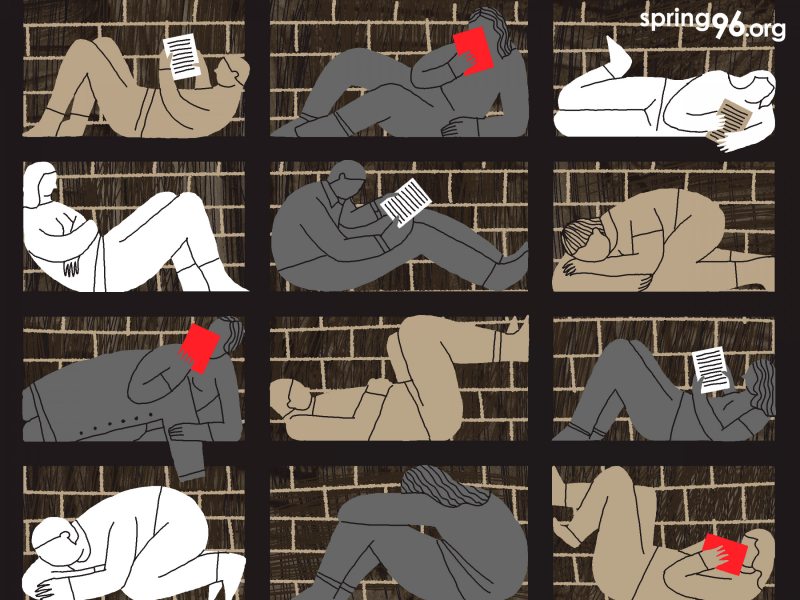Torture with stress positions, the threat of termination of parental rights: the abuse that Belarusian women face
The Viasna Human Rights Center contacted the Office of the United Nations High Commissioner for Human Rights (OHCHR) and informed it of known evidence of torture and cruel, inhuman, and degrading treatment of women.

- A cell in Akrescina. Illustration by Volha Prankevich
Data collection
The data submitted by human rights defenders was collected as part of documenting torture and ill-treatment committed by the Belarusian authorities and other persons on the eve of the 2020 presidential elections and beyond. The Viasna Human Rights Center has the informed consent of victims (detainees who faced the use of a pressure against them) and witnesses (persons who informed human rights defenders about the use of a pressure against others) to use and publish anonymized information, as well as to transfer it in an anonymous form to UN human rights mechanisms. Over a period of three years and five months, a total of 193 women were documented.
After we analyzed documented stories, it turned out that the reports of 106 women include information about detention and subsequent imprisonment in places of deprivation of liberty. All of them have faced human rights violations.
Known information
37 women reported specific circumstances of physical violence during detention and imprisonment.
When women recall their detention, they report being beaten on the legs with a police baton and being beaten while lying on the ground. A riot police officer told one of the women during the beating: "That's what you get for the stones and for Molotov cocktails, I will teach you how to live, I will teach you how to get money," addressing her in the plural "children of bitches."
Ill-treatment often appears in the reports of searches with breaking into apartments. For example, one of the women reported that a police officers during a forced entry into her apartment grabbed the woman by the collar and threw her away from himself, and she fell to the floor.
The women interviewed report injuries as a result of harsh detention. For example:
- sore knee and hematomas 2.5 cm deep two weeks after the beating;
- fractured arm with four splinters and nerve damage;
- closed fracture of a kneecap with displacement of fragments, damage to the ligamentous apparatus of both elbow joints, numerous abrasions and bruises;
- hematomas, etc.
32 women directly reported that they had faced moral pressure from internal affairs officers during detention, as well as during imprisonment in places of deprivation of liberty.
Nine women reported threats of sexual violence.
Four women faced threats of termination of parental rights.
Almost all women reported experiencing fear, shame, and humiliation, as well as an unstable psychological state after release.
18 women shared that during their detention they were tortured by stress positions: they were forced to stand in an uncomfortable and unnatural pose they had to stay in to exhaustion.
Five women said that during their detention they were "tortured with music", that is, the music was turned on very loudly, which prevented them from sleeping or calming down and recovering.
There is also a widespread problem of the lack of quality medical care during detention and imprisonment.
13 women whose stories were documented stated that they were denied medical care, and 4 women reported that medical care was provided poorly and in insufficient quantity, or did not correspond to the necessary care.
All the respondents reported unsanitary conditions of detention, and 27 women said that there were no hygiene items.
Conclusion
The results of the analysis of documented stories indicate serious violations of the rights and abuses against 106 women who have been documented and subjected to detention and imprisonment in places of deprivation of liberty. Physical violence, moral pressure, threats of sexual violence and termination of parental rights are widespread phenomena in the Belarusian context.
Human rights defenders have documented cases of physical violence, including beatings and harsh detention, as well as forced entry into residential premises, indicate a violation of the basic principles of legality and human dignity. The resulting injuries, such as fractures, bruises and hematomas, are serious consequences of these actions.
Moral pressure from internal affairs officers and the use of threats of sexual violence create additional traumatic conditions for detained women. Threats of termination of parental rights are another aspect of systematic violations.
The lack of high-quality medical care and unsanitary conditions of detention exacerbate the current situation. The denial of medical care, its poor quality, and the lack of necessary hygiene products constitute serious violations of the healthcare standards.
In general, these testimonies underline the urgent need for an international response to the current practice of detention and imprisonment, taking into account the protection of the rights and safety of all detainees, especially vulnerable categories such as women.
Viasna Human Rights Center reminds of the importance of documenting one's stories. Please write to:
Telegram: @ViasnaDOC | Email: viasnadoc@spring96.org
If you are a woman and you have experienced physical violence or other violations by male law enforcement officers during detention and subsequent imprisonment in places of deprivation of liberty, Viasna legal service suggests filing a complaint with the Committee on the Elimination of Discrimination against Women. For help with an appeal, please contact us:

















